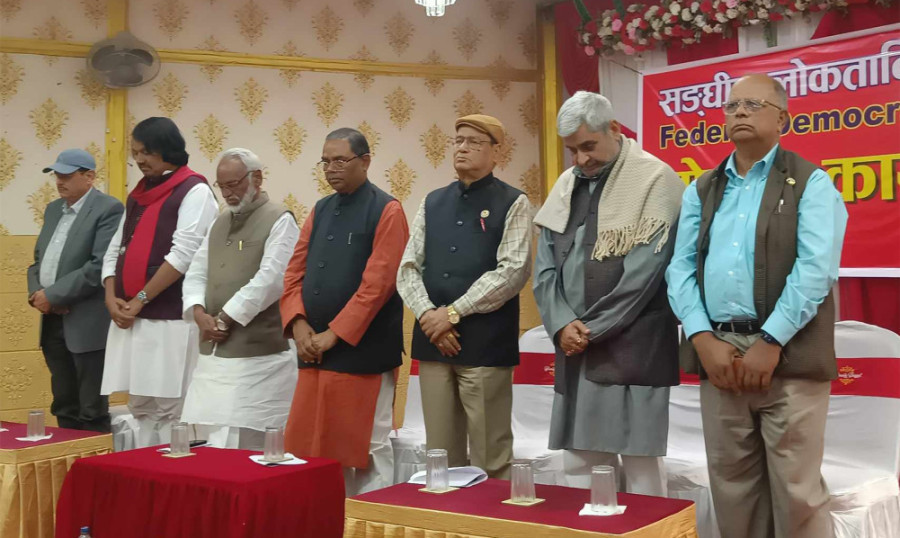Politics
Gen Z uprising, federalism fears drive Madhesh parties closer
Some Gen Z groups want to rethink the constitution and the federal framework it embraces.
Purushottam Poudel
As debates over the suitability of the current constitution and the federal model it embraces resurface in the aftermath of the Gen Z movement, Madhesh-based parties have initiated efforts to unify. They fear the federal system, one of the key gains of the 2007 Madhesh movement, could come under threat in the changing political climate.
The 2007 Madhesh movement heralded Nepal’s federal system and other progressive political arrangements. Building on the foundation laid by that movement, the interim constitution of 2007 was amended to include provisions related to federalism, which were later retained in the constitution promulgated in 2015. It was through the strength of the Madhesh uprising that Nepal was transformed into a federal system.
However, Madheshi leaders and analysts argue that the demands of the movement were not limited to federalism and many of other related issues remain unaddressed. They also express concern that, in the changing context following last month’s Gen Z movement, which was against rampant corruption and also carried anti-incumbency sentiments, questions might arise even over the federal structure that was achieved through the Madhesh movement.
In the wake of the Gen Z movement that toppled the coalition government led by KP Sharma Oli, an interim government was formed to hold parliamentary elections on March 5 next year.
Some Gen Z groups have raised the issue of amending the constitution. This has prompted concerns among Madhesh-based political parties and analysts, who fear that such demands might ultimately call into question the federal system achieved after much struggle.
Political analyst Chandra Kishore says that while preserving the achievements so far, Gen Z youths should move forward with the aim of challenging the deep-rooted flaws in society. Describing Gen Z groups as ‘mayavi’ (elusive), he notes that they are diverse groups who do not share the same ideology.
“Gen Z is a generation whose efforts have shaken the nation, but if that tremor begins to undermine past achievements, it could ultimately prove counterproductive for Gen Z themselves,” Kishor said.
The Federal Democratic Front had last year tried to bring most Madhesh-based parties under a loose umbrella. Following the Gen Z protests, Madheshi leaders are now actively considering full unification, and they say groundwork for it is already underway.
A formal proposal for unification has been tabled among the parties affiliated to the front, which includes the Janata Samajbadi Party Nepal led by Upendra Yadav, the Loktantrik Samajbadi Party Nepal led by Mahantha Thakur, the Rastriya Mukti Party Nepal led by Rajendra Mahato, the Janata Pragatisheel Party led by Hridayesh Tripathi, the Terai Madhesh Loktantrik Party led by Brishesh Chandra Lal, and the Nagarik Unmukti Party under the patronage of Resham Chaudhary.
The Janamat Party led by Dr CK Raut was also affiliated with the front but has stopped attending its meetings.
Rastriya Mukti Party General Secretary Keshav Jha stated that unification efforts have started in response to growing concerns that federalism could come under threat in the changed political context.
“As signs of an attack on federalism start to, we have made efforts to accelerate the process of party unification,” Jha said.
Monika Niraula, a representative of the Gen Z Movement Alliance, said that until recently, some members within Gen Z groups questioned issues related to the constitution and federalism, such voices have begun to weaken.
She added that certain groups in Nepal that do not accept federalism, secularism, and similar principles, had tried to use the Gen Z movement to advance their own agenda. However, Niraula noted that in recent times, Gen Z groups have become more aware and cautious about such attempts.
“Our alliance has never been in favour of scrapping the constitution, federalism, or secularism—these are non-negotiable issues for us,” Niraula said. “Some members within certain Gen Z groups had previously carried that agenda, but now even they are changing their views.”
However, she clarified that this does not mean no members within the Gen Z groups still raise such voices.
The Gen Z group led by Miraj Dhungana, which recently announced to form a party and declared it would not contest the upcoming election, said it is in favour of reconsidering federalism. The group does not support continuing with the constitution as it stands.
“The Gen Z movement was not about removing KP Oli and installing Sushila Karki as prime minister,” said Avinash Kunwar, a member of the Dhungana faction. “When it is evident that federalism has not been functioning effectively, we want to reassess the system.”




 8.43°C Kathmandu
8.43°C Kathmandu















